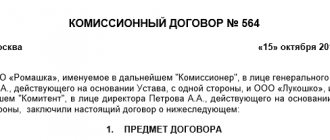There are different forms of activity of intermediaries who act in the interests of legal entities. Such interaction between the parties usually lasts a long time. And the agent acts when conducting transactions, both on his own behalf and on behalf of the customer. What is an agency agreement concluded with an individual?
CALL A LAWYER
HE WILL SOLVE YOUR QUESTIONS FOR FREE Moscow, region 8 (499) 577-00-25 ext. 130 St. Petersburg, region 8 (812) 425-66-30 ext. 130 Federal number 8 (800) 350-84-13 ext. 130
The conclusion of an agreement obliges the intermediary to perform certain actions (conducting and completing transactions, searching for agents to buy or sell products and other actions).
An agreement is concluded in writing between the parties, that is, between the agent and the customer (a sample agreement is here). The powers of the performer are not always specified immediately. They depend on the actions performed by the intermediary.
The agency agreement provides for the contractor to perform the following activities:
- Representation and negotiations during the search for counterparties,
- Sales of products produced by the customer,
- Carrying out actions of a legal or consulting nature,
- Purchase of components for production,
- Other actions.
The intermediary is obliged to provide the customer with a report on the actions taken. Payments to the contractor when providing services are necessarily taxed, as they are income.
Taxation
When the contractor is a civilian, personal income tax is paid at a rate of 13% of the wages received. Contributions to the Pension Fund are also withheld.
A person with individual entrepreneur status calculates taxes and fees himself. At the end of the year they are provided with a declaration. Accounting for an agency agreement with an individual
The organization must keep accounting records for any agency agreements. Both invoices and invoices based on the details of the contractor are taken into account, and so on.
In what cases can an agency agreement be concluded?
An individual or legal entity acting as a Principal does not keep a time sheet for the Individual Agent and should not require him to comply with the working hours, because under an agency agreement, no labor relations arise between the parties. The individual must be fully capable.
The main difference between an agency agreement and similar agreements is that the Agent has the right to perform a wider range of actions than other intermediaries. It is advantageous to formalize it if there is a need to transfer to an intermediary the authority to perform legally significant as well as other actions (transfer of goods, search for suppliers, attracting clients, performing work, representing interests, etc.).
An agency agreement with an individual, a sample of which you can find below, is advisable to conclude if:
- the work is not permanent;
- there is a need to hire a person who lives in another region;
- The agent is not required to be present at the workplace every day and adhere to the work schedule.
The execution of this document is an alternative to including an employee in the organization’s staff. It should be noted that such an agreement usually involves long-term cooperation. If an organization or individual entrepreneur needs to perform a one-time transaction by an intermediary, it is better to sign a commission or commission agreement.
Performer's remuneration
Remuneration for the intermediary is a mandatory condition of the agency agreement. Accrual is made on the basis of submitted reports on work performed. For an individual, a written report is sufficient, but for an individual entrepreneur, in addition to the report, an invoice is also added.
Attention! The information in this article may be out of date! To clarify the information, fill out the application below and a qualified lawyer will help solve your problem or call the numbers listed on the website. Free consultation or call!
General provisions
So what is an agency agreement concluded with an individual, and what are its features?
This is an accepted written agreement between two parties that does not require registration with government agencies. This document involves the performance of certain actions by an agent - an individual on the instructions of the principal - the employer . All important features, conditions and principles of interaction between these parties follow from civil legislation, Chapter 52 of Part Two of the Civil Code of the Russian Federation:
- Initially, it defines the concepts of an agent - the executor of the order and a principal - the customer, and establishes the principles of their relationship. According to Art. 1005 of the Civil Code, an agent can assume responsibility and work with a third party on his own behalf, but at the expense of the customer. Another option is on behalf of the latter and at his expense. In this option, the rights and obligations under the transaction will be borne by the principal, and the agent, in principle, will provide intermediary services. Therefore, a clause on the responsibility of the parties must be included in the document.
- In Art. 1006 of the Civil Code describes the principles of payment of agency fees. It must be borne in mind that if the document does not reflect the terms of payment, then the principal will be forced to pay the money a week from the date of the executor’s report. For the employer, of course, it will be beneficial to include a separate clause in the duration of the agreement in order to avoid unexpected consequences.
- In Art. 1007 of the Civil Code defines possible restrictions in relationships. So, for example, a restriction may be the employer’s obligation not to enter into other agreements (in this activity). The restriction for the agent is the impossibility of carrying out actions fixed by the contract with other principals. In addition, in the case of, for example, concluding an agency agreement with an individual. person to search for clients, you can establish a restriction on the employer’s right to search for clients independently.
- Given that in these relationships all the person’s expenses are borne by the customer, this person needs to periodically report on his work and expenses incurred. In Art. 1008 of the Civil Code stipulates that it is mandatory to attach the necessary primary expenditure documents to the report; the important point is the date of submission and the period for checking the documents - by default, within 30 days, the customer is obliged to check the documents and report any disagreements.
- In the course of work, the agent himself may enter into subagency contracts, the terms of which are established by Art. 1009 Civil Code. The parties must also agree on the subagency and reflect the outcome in writing.
- Termination of such a contract with an individual. person is possible on the basis of Art. 1010 GK:
- refusal of its execution by any of the parties, but only if the terms are not specified in it;
- death of the performer;
- declaring him incompetent or missing.
- Depending on whose name the agent acts, his relationship with the employer can be built on the principles of contractual terms of the assignment or commission (Article 1011 of the Civil Code).
When drawing up agency agreements with an individual, you should rely on the above information. If the agreement is drawn up correctly, taking into account all the nuances that arise, such a relationship is beneficial and convenient for both parties.
For a person, the main convenience will be the opportunity to earn money on their own, at a time convenient for themselves, and also with reimbursement of expenses.
For an employer, this is a convenient way to find a good specialist to perform non-core activities for the company (this could be the services of an auditor, marketer, accountant, lawyer, services aimed at selling goods, etc.) for a certain time and save on a permanent salary for a staff member and , of course, the cost of an additional workplace. Also, the employer will be able to terminate the contract or refuse payment (or possibly both) if it is not completed efficiently and on time. However, most likely this will not happen, because the performer in such a relationship is interested in showing his best side.
You can familiarize yourself with the proposed sample form of an agency agreement below.
Sample agency agreement with an individual.
It is imperative to take into account that in addition to all of the above, the document must have:
- full details of the Principal;
- Agent's passport details;
- a detailed list of those assigned;
- liability in case of possible non-compliance with obligations;
- the start and end period of the document (if desired, the possibility of extension);
- date of signing the document, signatures of the parties.
How to fill it out and its sample
The agreement can be drawn up either on a computer or by hand. At the same time, it is obliged to contain only reliable information. The agreement can only be signed by an authorized person.
When drawing up a contract, it is necessary to describe each point in detail. This will allow you to avoid possible disagreements in the future between the contractor and the customer, and will also eliminate unwanted expenses.
The header of the document must contain information about the place and date of its preparation, as well as about the parties between whom the agreement is being concluded.
If one of the parties is represented not by the owner himself, but by a legal representative, then the contract must indicate regulations or other documents that give the citizen this right.
The following information should contain:
- about the subject of the contract. In this paragraph it is necessary to indicate for what purposes the principal is hiring the agent. The same paragraph indicates on whose behalf the agent will act; it is possible to indicate a mixed type;
- about the rights and obligations of each party. The preparation of this section should be taken responsibly, since it is on its basis that the activities of each of the parties will be carried out. In addition, this provision can be used to resolve conflict situations that arise during the performance of the agent’s official duties;
- about the remuneration that the agent can count on when performing the actions prescribed by the contract. If this clause is not present, then the remuneration is calculated taking into account the average market cost of services of this type;
- about the responsibility of each party;
- about the period for which the contract is concluded. It can be either urgent or indefinite. The second option is the most common. Moreover, if the validity period of the contract is not specified, then each party can terminate the agreement at any time;
- on the procedure for document flow between the parties;
- about confidentiality;
- on limiting the rights of each party. At this point, the principal may prohibit the agent from entering into similar agreements with other principals. Information on the conclusion of a subagency agreement may also be indicated here;
- about the reasons why the contract may be terminated;
- about payment methods.
At the end of the document the details and signatures of each party to the agreement must be indicated. If necessary, the presence of an appendix is indicated at the end of the document.
At the request of the parties, the list of information specified in the clauses of the agreement can be expanded. At the same time, all data must be approved by each party.
Sample filling:
Agency agreement (agent is an individual)
Agency contract
(agent is an individual)
[place of conclusion of the contract] [day, month, year]
[Name of organization], represented by [position, full name], acting on the basis of [charter, regulations, power of attorney], hereinafter referred to as “Principal,” on the one hand and
citizen of the Russian Federation [F. I.O.], [day, month, year] of birth, passport [series, number, date of issue, by whom, department code], residing at the address: [enter as necessary], hereinafter referred to as “Agent”, on the other hand the parties, collectively referred to as the “Parties”, have entered into an agreement as follows:
1. The Subject of the Agreement
1.1. Under this agreement, the Agent, for a fee, undertakes, on behalf of, on behalf of and at the expense of the Principal, to perform [list legal and other actions] aimed at [fill in as necessary] (hereinafter referred to as Agency activities).
1.2. [Indicate commercial and other requirements for the content and nature of Agency activities].
1.3. For transactions made by the Agent with third parties on behalf and at the expense of the Principal, the rights and obligations arise directly from the Principal.
1.4. The territory of the Agent’s activities under this agreement is [fill in as appropriate].
2. Rights and obligations of the Parties to the agreement
2.1. The principal undertakes:
2.1.1. Provide the Agent with all necessary information, property and documents to carry out Agency activities.
2.1.2. Provide the Agent with funds to carry out Agency activities, namely: reimburse the expenses incurred by the Agent related to the execution of this agreement.
2.1.3. If necessary, issue a power of attorney(s) to the Agent to perform all necessary actions under this agreement.
2.1.4. Pay the Agent remuneration for carrying out Agency activities.
2.1.5. Accept from the Agent a report on the work done, the documents attached to it and everything performed by him within the framework of the assignment under this agreement.
2.1.6. Notify the Agent of any objections to the submitted report within [meaning] days after its submission.
2.1.7. Do not enter into similar agency agreements with other agents operating in the territory specified in this agreement.
2.2. The principal has the right:
2.2.1. Exercise control over the activities of the Agent regarding the execution of the order.
2.2.2. Provide the Agent with additional instructions regarding the execution of orders under this agreement.
2.2.3. Receive information about the progress of the Agent’s execution of this agreement.
2.3. The Agent undertakes:
2.3.1. Carry out Agency activities in good faith, with maximum benefit for the Principal.
2.3.2. Follow the Principal's instructions regarding the implementation of Agency activities, unless these instructions contradict the requirements of the law.
2.3.3. Provide the Principal, upon his request, with all information about the progress of execution of the order under this agreement.
2.3.4. Provide the Principal with reports on the work done under this agreement.
2.3.5. Provide the Principal with an estimate of the costs associated with the execution of this agreement, supported by documents.
2.3.6. Do not enter into similar agency agreements with other principals, which must be executed in the territory that fully or partially coincides with the territory specified in this agreement.
2.3.7. After the execution or termination of this agreement, within [value] days, return to the Principal the power of attorney(s), the validity of which has not expired.
2.4. The agent has the right:
2.4.1. Conclude a subagency agreement with another person, remaining responsible for the actions of the subagent to the Principal.
2.4.2. Timely and in full receive from the Principal all agreed amounts of expenses incurred, as well as remuneration in accordance with this agreement.
3. Agent's remuneration and payment procedure
3.1. The Agent's remuneration under this agreement is [in figures and words] rubles.
3.2. The remuneration under this agreement is paid by the Principal to the Agent as follows: [at a time, no later than (value) days from the date of submission of the report on the work done / upon achieving the required result within [value] days / with frequency (specify terms)].
3.3. The Principal pays the expenses incurred by the Agent related to the execution of this agreement within [meaning] days from the date of submission of documents confirming these expenses.
3.4. Payment of remuneration and reimbursement of expenses to the Agent is carried out by transferring funds to the Agent’s bank account.
3.5. The Principal's obligation to pay remuneration and expenses is considered fulfilled from the date of [debiting funds from the Principal's current account / receipt of funds to the Agent's bank account].
3.6. The Principal, in accordance with the legislation of the Russian Federation, is a tax agent, and therefore remuneration to the Agent is paid minus personal income tax.
4. Agent reports
4.1. The Agent undertakes to provide the Principal with reports on the work done.
4.2. Reports are submitted by the Agent within the following timeframes: [indicate specific deadlines for submitting reports / as the contract is executed / at the end of the contract] by [indicate the method of transmitting reports].
4.3. The submitted report must contain: [fill in as appropriate].
4.4. The Agent must attach to the report the necessary evidence of expenses incurred by the Agent in the execution of this agreement.
4.5. If the Principal has any objections to the Agent’s report, the Principal must notify the latter of them within [meaning] days from the date of receipt of the report. Otherwise, the report is considered accepted by the Principal.
5. Privacy
5.1. The Parties have agreed to maintain confidentiality any information received by one Party regarding the other during the execution of this instruction. The confidentiality regime applies to the text of this agreement and its basic terms, as well as to any other information that either Party identifies as confidential before or immediately after it is provided to the other Party.
5.2. Information recognized as confidential in accordance with this agreement cannot include information that is publicly available in accordance with the requirements of Russian legislation.
5.3. Our confidentiality obligations will survive the expiration or termination of this agreement until [fill in the blank as appropriate].
5.4. For violation of the confidentiality regime under this agreement, the Party that committed such a violation is obliged to compensate the other Party for direct losses incurred in connection with this violation, as well as pay a fine in the amount of [value] rubles.
6. Responsibility of the Parties
6.1. In case of non-fulfillment or improper fulfillment of their obligations under this agreement, the Parties shall be liable in accordance with the current legislation of the Russian Federation.
6.2. The Agent is responsible in the amount of actual damage for the safety of documents, property and material assets received by him from the Principal or third parties in the process of executing this agreement.
6.3. For violation of the deadlines for payment of remuneration, the Principal shall pay the Agent a penalty in the amount of [value] percent of the debt amount for each day of delay.
7. Procedure for changing and terminating the contract
7.1. All changes and additions to this agreement are formalized by additional agreements of the Parties in writing, which are an integral part of this agreement.
7.2. This agreement is terminated due to the death of the Agent, his recognition as incapacitated, partially capable or missing.
7.3. This agreement may be terminated early at the initiative of either Party.
The initiating Party notifies the other Party of its intention to terminate this agreement [value] business days before the expected date of termination of the agreement by sending a written notice [indicate the method of sending the notification].
7.4. If the Principal has abandoned this agreement, the Agent retains the right to remuneration for services rendered by him before the termination of this agreement.
8. Dispute resolution procedure
8.1. Disputes and disagreements that may arise during the execution of this agreement will, if possible, be resolved through negotiations between the Parties.
8.2. If the Parties do not reach an agreement, disputes will be resolved in court in accordance with the current legislation of the Russian Federation.
9. Final provisions
9.1. This agreement has been drawn up in two copies having equal legal force, one copy for each of the Parties.
9.2. The Agreement comes into force from the moment of signing and is valid until [day, month, year].
9.3. In all other respects that are not provided for in this agreement, the Parties are guided by the legislation of the Russian Federation.
10. Addresses and details of the Parties
Principal Agent
[enter as required] [F. I. O., signature]
M.P.
Is it necessary to notarize an agency agreement?
It is not mandatory to notarize the agreement; this is at the discretion of the parties. For notarization of the contract, you will need to pay an amount determined by the notary.
An agreement certified by a notary will have greater legal force, since its conclusion will in fact be confirmed by a third party - a notary, who is also responsible within the framework specified by law.
In a situation where an agreement is concluded with an individual, depending on what the agent must do, a notarized power of attorney may be needed, but as a general rule, the mandatory issuance of a power of attorney is not required.
State registration of agency agreement
There is no need to register an agency agreement anywhere; the law does not establish such a requirement, in contrast, for example, to the mandatory registration of lease agreements concluded for a period of 1 year or more.
Registration is not required, because under an agency agreement no property is transferred to anyone or encumbered, as, for example, when establishing an easement. The role of the agent under such an agreement is to perform some legal and factual actions as an intermediary in the interests of the principal, which may be associated with this property, for example, finding a tenant.
Form and content
The form of the agency agreement must meet all the requirements for documents when executing a transaction. The agreement is concluded only in writing. It should reflect all the main points at which the transaction is concluded.
A contract form is available.
The agency agreement must include sections that reflect the following information:
- about the subject of the transaction;
- on granting the right to carry out activities;
- on the procedure for making payments and methods of payment for services provided;
- about the methods and situations in which goods are returned to the supplier;
- on the rights and obligations of each party to the transaction;
- about the liability that the party who fails to fulfill the terms of the contract will bear;
- about circumstances that occurred due to unforeseen situations, for example, natural disasters;
- on the reasons and methods of termination of the contract;
- on ways to resolve potential disputes;
- about the validity period of the document and the duration of the transaction;
- about additions and changes;
- about the legal address and details to which the funds will be transferred.
The document must end with the date of preparation and signatures of each party. It is worth considering that if the agreement contains the signature of only one party, then it is considered invalid.









